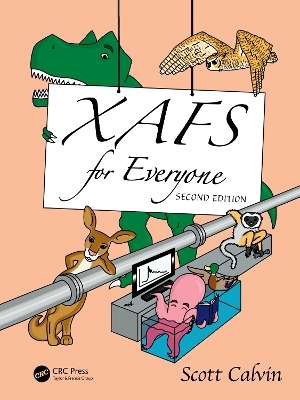
XAFS for Everyone
CRC Press (Verlag)
978-1-032-74548-0 (ISBN)
This second edition now includes chapters on spatial and temporal resolution, alternative measurement modes including resonant inelastic x-ray scattering (RIXS) and high-energy resolution fluorescence detection (HERFD), and an expanded chapter on experimental design. In addition, this edition adds new sections on wavelet transforms, blind source separation, free electron lasers, and theoretical XANES standards, as well as three new case studies.
XAFS for Everyone covers sample preparation, data reduction, tips and tricks for data collection, fingerprinting, linear combination analysis, principal component analysis, and modeling using theoretical standards. It describes both near-edge (XANES) and extended (EXAFS) applications in detail. Examples throughout the text are drawn from diverse areas, including materials science, environmental science, structural biology, catalysis, nanoscience, chemistry, art, and archaeology. In addition, eight case studies from the literature demonstrate the use of XAFS principles and analysis in practice.
The text includes derivations and sample calculations to foster a deeper comprehension of the results. Whether you are encountering this technique for the first time or looking to hone your craft, this innovative and engaging book gives you insight on implementing XAFS spectroscopy and interpreting XAFS experiments and results. It helps you understand real-world trade-offs and the reasons behind common rules of thumb.
Key Points:
New cases studies will be added to the end of the book
Multiple sections are being refreshed or almost completely re-written to reflect the changes in the field since the first edition. For example: important new synchrotron light sources have come in to operation across the world, including NSLS-II in North America, MAX IV and Solaris in Europe, the Taiwan Photon Source in eastern Asia, and SESAME in the Middle East. New analysis software has been developed, while other software has fallen in to disuse.
Discussions of wavelength dispersive detectors will be added throughout the book, as well as wavelet transforms
Scott Calvin has been using x-ray absorption fine structure (XAFS) since 1998 to study systems as diverse as solar cells, magnetic nanoparticles, soil samples, battery cathodes, analogues to atmospheric dust particles, and pigments used in 18th-century paintings. Dr. Calvin is currently the director of the prehealth program at Lehman College of the City University of New York, helping students their achieve their dreams of becoming physicians, dentists, pharmacists, veterinarians, and more.
Front Matter Part 1: The XAFS Experiment 1. XAFS in a Nutshell 2. The Hardware: Light Sources, Beamlines, and Detectors 3. Spatial and Temporal Resolution 4. High-Energy-Resolution Techniques 5. Experimental Design 6. Sample Preparation 7. Data Reduction 8. Data Collection Part 2: XAFS Analysis 9. Fingerprinting 10. Linear Combination Analysis 11. Principal Component Analysis 12. Curve Fitting to Theoretical Standards Part 3: Modeling 13. A Dictionary of Parameters 14. Identifying a Good Fit 15. The Process of Fitting 16. Starting Structures 17. Constraints Part 4: XAFS in the Literature 18. Communicating XAFS 19. Case Studies
| Erscheinungsdatum | 22.08.2024 |
|---|---|
| Zusatzinfo | 18 Tables, black and white; 18 Line drawings, color; 198 Line drawings, black and white; 2 Halftones, color; 8 Halftones, black and white; 20 Illustrations, color; 206 Illustrations, black and white |
| Verlagsort | London |
| Sprache | englisch |
| Maße | 210 x 280 mm |
| Gewicht | 1260 g |
| Themenwelt | Naturwissenschaften ► Biologie |
| Naturwissenschaften ► Chemie ► Analytische Chemie | |
| Naturwissenschaften ► Physik / Astronomie ► Atom- / Kern- / Molekularphysik | |
| Technik ► Maschinenbau | |
| Technik ► Umwelttechnik / Biotechnologie | |
| ISBN-10 | 1-032-74548-7 / 1032745487 |
| ISBN-13 | 978-1-032-74548-0 / 9781032745480 |
| Zustand | Neuware |
| Informationen gemäß Produktsicherheitsverordnung (GPSR) | |
| Haben Sie eine Frage zum Produkt? |
aus dem Bereich


